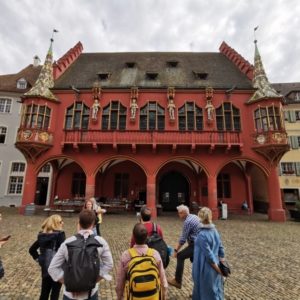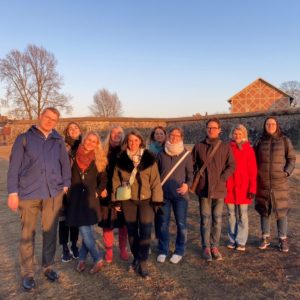Material
Guidelines for planning curricula in teacher education to support coherence
Information
Name of the institution(s) or teams
University of Turku, Department for Teacher Education
Format
Title
Guidelines for planning curricula in teacher education to support coherence
Keywords
teacher education curricula, theory, practice, enacting practice, coherence, reflection, vision of teacher education programs, self-efficacy
Topic
A digital tool for teacher educators’ course and curricular planning
Goals
To support teacher educators, when they plan teacher education programs and curricula. The goal is to support teacher educators’ individual and collaborative work.
In specific, the aim of the tool is:
- to encourage educators and students to reflect upon visions of teacher education programs
- to enhance students to construct coherence between theory and practice
- to create opportunities for students to analyse practice
- to support students’ opportunities to enact practice
- to support students’ sense of self-efficacy
- to create opportunities for students to benefit from digital tools and learning environments
Domains/aspects of internationalization (fill in the category from the grid)
Groups of students from different countries work together in a virtual classroom and create common projects, which are presented during the course.
Target group
Teacher educators in classroom teacher and subject teacher education
Educational level and study year
All educational levels in teacher education
Context information users would need to understand the digital tool
(e.g., about the TE system, curricular integration)
Teacher education programs are striving for developing curricula that support high-quality student learning and development of competences that are needed in future teacher profession. (Mikkilä-Erdmann et al. in preparation) Teaching is a complicated, many-faceted competence requiring high-level expertise. Teachers are expected to be well educated and develop their skills as “knowledge workers” with profound theoretical domain-specific understanding and general cognitive and social skills. In addition to that, the so-called situation-specific skills are required in the classroom interaction situations (Metsäpelto et al. 2022). European teacher education programs are many-faceted and differently structured and designed. However, through the suggested guidelines we intend to support teacher educators in different institutions and in different roles to reflect on the following dimensions in teacher education: Coherence of theory and practice, opportunity to analyze practice, opportunity to enact practice, teacher self-efficacy and vision of teacher education program. The dimensions are based on the pilot survey conducted in Finland. (Mikkilä-Erdmann et al. in preparation) These guidelines are intended to support teacher educators’ reflection on how to support coherence in teacher education.
Language of the example
English
License
Copyright
In how far does your approach strengthen the internationalization (of the curriculum) in Teacher Education?
The outcome, Guidelines for planning curricula in teacher education to support coherence, is based on a digital survey that was developed in international collaboration (ConnEcTEd IO4 and other IOs). In the future, the document will reach teacher educators internationally through the ConnEcTEd open access portal and will influence curricular work in teacher education.
Which dimensions of digital transformation in teaching for teacher educators did you incorporate (utilize)?
This outcome will be available for teacher educators in digital format on ConnEcTEd platform.
How have you utilized digital tools/methods/resources in your teaching practice to strengthen coherent/integrative and/or international approaches, and what specific strategies or techniques have you found to be effective in achieving this objective?
Not applicable
How have you employed co-creative approaches and/or participatory design in your use of digital tools to enhance student learning and engagement, and what have been some of the successful outcomes that you have observed as a result?
A digital survey tool was designed based on previous research (see references below) by IO4 in collaboration with other partners in the framework of ConnECTed project. Hence, the survey is based on successful collaboration with international research partners using co-creative and participatory approach.
Download
Download
(PDF)
Download PDF
DownloadEvents: ConnEcTEd
Blog: ConnEcTEd
Es gibt derzeit noch keine Beiträge in dieser Kategorie.

Reisebericht: ConnEcTEd Project Meeting in Zagreb
Ein zentrales Anliegen der School of Education FACE ist die Entwicklung kohärenter – also strukturell und inhaltlich sinnhaft zusammenhängender – Curricula oder Module im Rahmen des Lehramtsstudiums. Was liegt da in Zeiten der Globalisierung näher, als sich anzusehen, wie dieses Prinzip in anderen Staaten und Bildungssystemen umgesetzt wird? Im Rahmen des Projekts ConnEcTEd geschieht genau das. Im September dieses Jahres reiste eine Freiburger Delegation nach Zagreb, um sich dort gemeinsam mit Projektpartner*innen aus Oslo, Nizza, Helsinki und Zagreb in Präsenz zu diesem wichtigen Thema auszutauschen.

Ins Bächle „dappen“, oder nicht? Treffen des ConnEcTEd-Teams in Freiburg
After the first in-person-meeting in March in Oslo, the ConnEcTED-Team met for the second time in Freiburg im Breisgau at the end of May. In the „Green City“ on the western edge of the Black Forest, right on the border to Switzerland and France, the project members reported on their work, discussed new tasks and further steps in the project, as well as forms of collaboration in different IOs.

Reisebericht: Das ConnEcTEd-Team in Oslo
Ein zentrales Anliegen der School of Education FACE ist die Entwicklung kohärenter – also strukturell und inhaltlich sinnhaft zusammenhängender – Curricula oder Module im Rahmen des Lehramtsstudiums. Was liegt da in Zeiten der Globalisierung näher, als sich anzusehen, wie dieses Prinzip in anderen Staaten und Bildungssystemen umgesetzt wird? Im Rahmen des Projekts ConnEcTEd geschieht genau das. Ende März dieses Jahres reiste eine Freiburger Delegation nach Oslo, um sich dort in Präsenz zu diesem wichtigen Thema auszutauschen.
Funding
This project receives funding from the Erasmus+ programme of the European Union (Strategic Partnerships, KA 203).
The contents of this website and the view expressed in the news and publications are the sole responsibility of the authors and under no circumstances can be regarded as reflecting the position of the European Union.




